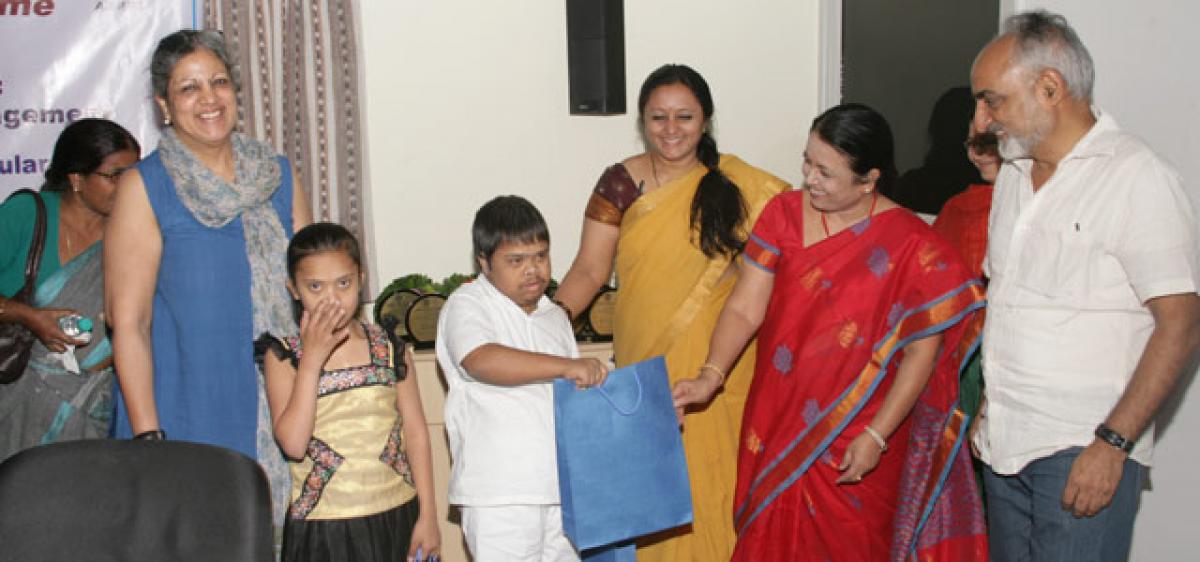Live
- Vizianagaram: ‘Looters, cheaters will be put behind bars’
- Jhansi says she will focus on holistic development of Vizag
- What Sam advocated
- Congress swings into damage control
- Pitroda's inheritance tax remarks fuel fresh attack
- Dharmavaram: A mastermind that played a spoilsport for TDP rivals
- KCR launches poll bus yatra
- Revanth dares KCR, Harish
- Modi frustrated, afraid of invisible voters: Kharge
- SC seeks clarification from EC on functioning of EVMs
Just In

Down syndrome can be avoided if detected before a child is born by a simple test costing between Rs 1,500 to Rs 2,000, but none of the government maternity hospitals conduct the test. Doctors say that at least the test could be done on high risk groups - especially with mothers who already gave birth to child with Downs. Within 20 weeks, doctors need to find out whether the fetus growing inside th
Hyderabad: Down syndrome can be avoided if detected before a child is born by a simple test costing between Rs 1,500 to Rs 2,000, but none of the government maternity hospitals conduct the test. Doctors say that at least the test could be done on high risk groups - especially with mothers who already gave birth to child with Downs. Within 20 weeks, doctors need to find out whether the fetus growing inside the womb is growing with Down syndrome.
Down syndrome cannot be prevented but can be detected before a child is born leaving an option before parents to terminate the baby. Individuals with Down syndrome are prone to heart defects, leukemia, early-onset of Alzheimer’s disease, gastro-intestinal problems and other health issues. It leads to mental retardation and abnormal physical growth if the child survives long. However, with advanced medical facilities the life expectancy has risen from 25 and many live up to the age of 60 and beyond.
Down syndrome is a genetic disorder caused by the presence of one extra chromosome. A normal person has 46 chromosomes and a person with Down syndrome has 47. Dr Lakshmi Rao Kandakuri, principal scientist at CCMB who has been working on Down syndrome says, “Chromosome 21 pair triplicate as there is an abnormal division in eggs and sperm. It is a random occurrence. It is a good idea to recommend screening tests for all pregnancies.”
Every year between 23,000 and 29,000 children are born in India with Down syndrome. Speaking to The Hans India, Dr Srinath, director, Asian Institute of Fetal Medicine and reproductive Genetics said, “One in 700 babies could have down syndrome. Per year we get close to 100 cases and this number is growing. Lack of awareness especially among the poor is a drawback.”
People especially from rural backgrounds are unaware about Down syndrome and many who visit government hospitals could be sensitised and tests be conducted says Ambika a speech therapist who helps patients suffering with Downs. “A large number of pregnant women from Mahbubnagar, Nalgonda, Ranga Reddy and Medak visit the government hospitals at Petlaburz and Koti.
Majority of them are unaware about the disease and no one informs them about Down syndrome. The government hospitals should conduct screening tests which could bring down the number of Down syndrome patients,” says Dr Parvati, a gynaecologist.

© 2024 Hyderabad Media House Limited/The Hans India. All rights reserved. Powered by hocalwire.com







